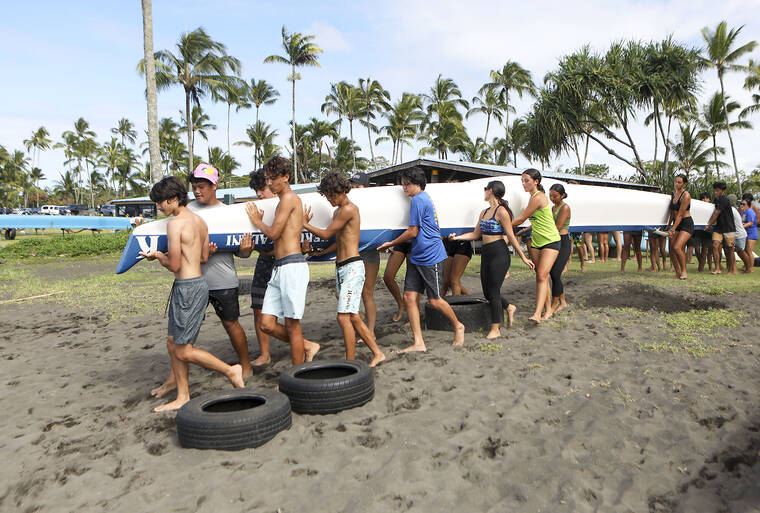Research finds paddling is an opportunity to improve public health

Kelsey Walling/Tribune-Herald A boys crew paddles together while practicing for an upcoming regatta in Hilo Bay on Wednesday, June 21, 2023.

Kelsey Walling/Tribune-Herald Coach Keahi Warfield explains the warm up to youth paddlers during practice at Hilo Bay on Wednesday, June 21, 2023.

Kelsey Walling/Tribune-Herald Paddlers work together to move a canoe to the water during paddling practice for an upcoming regatta in Hilo Bay on Wednesday, June 21, 2023.
Physically demanding but culturally relevant sports could be a way to improve public health in Hawaii.
Physically demanding but culturally relevant sports could be a way to improve public health in Hawaii.
A new study by researchers at the University of Hawaii at Manoa found that 1 out of 5 Hawaii residents have participated in outrigger canoe paddling. About 42% of Native Hawaiians have paddled during their life times.
ADVERTISING
According to researchers from the UH Office of Public Health Studies, the state Department of Health and the John A. Burns School of Medicine, paddling appeals to a wide range of ages, ethnic groups and income groups.
Recently, the nonprofit, Keaukaha One Youth Development, developed a paddling program that extends beyond regatta season and involves after-school programs to help more kids mentally and physically get through the school year.
“I’ve seen paddling help intervene with social issues kids face like substance abuse and suicide. It helps their emotional and physical health, but also brings a balance to life,” said Keahi Warfield, coach for the Keaukaha Canoe Club. “It’s a traditional practice, so they take pride in it. It’s a good way to establish values, and I think those values help kids deal with things today and what’s next in life.”
KOYD is dedicated to helping underprivileged Native Hawaiian youth ages 8 to 18 from the Hilo community reveal their individual strengths and passions by building leadership skills, self-esteem and motivation while gaining positive relationships for future careers and academic success.
One of the ways this is done is through paddling year round.
“One of the reasons we went year round was because we unfortunately suffered a suicide in our group,” Warfield said. “He was paddling in regattas, and then the season ended, and the situation happened in our off time. We initiated after-school programs to help kids who may be suffering without an outlet.”
On Wednesday afternoon, dozens of kids — all Native Hawaiian and from schools in East Hawaii — practiced in Hilo Bay for their upcoming regatta on Saturday. After warming up with a run, the paddlers were excited to get in the water.
“I notice I’m happier since I’ve started paddling, and I look forward to it every day,” said Kamehameha Schools Hawaii student Tatiana Dunhour. “I’ve also lost a lot of weight and gotten stronger, which made me happier.”
Dunhour started paddling two years ago and has been enjoying getting to know her fellow paddlers, such as Hilo High student Zoe Aoki.
“I like that I get to interact with others, get to know new people and learn new skills every day,” Aoki said. “I definitely feel more clear-headed when I paddle, and I have a positive attitude every time I get in the canoe.”
Dunhour and Aoki both attributed their better mental health to paddling and hope to continue the sport outside of school.
“I like feeling the flow by working together and feeling the ocean,” Dunhour added. “Every time before a race, I always pray to my Papa because he was an avid ocean person. It definitely makes me feel more connected to him.”
Thirteen of the kids at Wednesday’s practice, including Dunhour and Aoki, will be traveling to Samoa in August to compete in the International Va‘a Federation World Distance Championship.
“When kids can get the opportunity to go to these competitions, their confidence is through the roof,” Warfield said. “It has served as a wonderful foundation for so many of these young people. They learn how to be compatible with each other, and they gain leadership skills. I think the payoff is amazing when you see these guys grow in school and in their future careers.”
The new research findings came from the Behavioral Risk Factor Surveillance System, a yearly health survey conducted by the DOH. In 2018, questions about outrigger canoe paddling and hula were included in the survey for the first time, and data for the study was collected over a three-year period.
“Public health surveys do not typically measure culturally relevant physical activity,” said Tetine Sentell, interim dean of the Thompson School of Social Work and Public Health, who led the study. “Because of our diverse population, it is vital that we promote culturally relevant activities like outrigger canoe paddling in public health programming, research and surveillance.”
The survey included about 13,500 respondents. Across all racial/ethnic groups, 20% had engaged in paddling sometime in their life. Participation in paddling was higher for Native Hawaiians and other Pacific Islanders than for all other groups.
The findings from the study indicate that paddling is widely enjoyed, making it a promising area for widespread community health promotion.
The researchers are now conducting additional surveys with more detailed questions about paddling and hula to further understand the implications for community health in Hawaii and beyond.
More information about the Keaukaha Canoe Club’s journey to Samoa for the IVF Distance Championships will be available soon. The event will be hosted by the Samoa Outrigger Canoe Association from Aug. 10 to Aug. 19.
Email Kelsey Walling at kwalling@hawaiitribune-herald.com.


